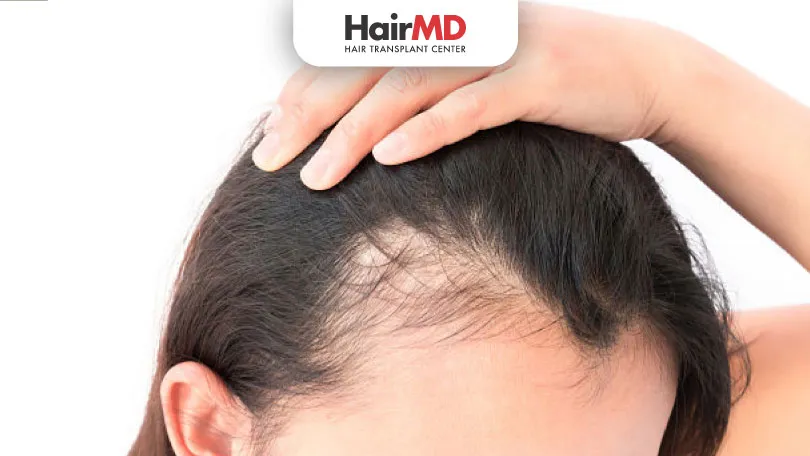11th Aug, 2022

Cicatricial alopecia, also known as scarring alopecia, is a condition where inflammation damages hair follicles, causing permanent hair loss and scarring on the scalp. This condition can affect both men and women, but it is uncommon in children. The damage is irreversible, making early diagnosis and treatment crucial.
Now that we understand what cicatricial alopecia is, let’s explore its causes, symptoms, and available treatment options to better manage this rare but serious form of hair loss.
What’s covered in the article?
- Causes of Cicatricial Alopecia?
- Cicatricial Alopecia Symptoms
- Cicatricial Alopecia Treatment
- Can Cicatricial Alopecia be Reversed?
- How Common is Cicatricial Alopecia?
- Consult HairMD for Cicatricial Alopecia
- Conclusion
Causes of Cicatricial Alopecia?
Usually, scarring is the result of inflammation that damages the hair follicles. Damage can result from a severe infection or burns. Researchers yet do not completely understand the causes of cicatricial alopecia. However, inflammation destroys stem cells and oil glands associated with the hair follicles. That leads to scarring and further hair loss. Cicatricial alopecia isn’t considered hereditary.
Cicatricial Alopecia Symptoms
Some of the symptoms of cicatricial alopecia include,
- Gradually developing hair loss leading to the bald patch
- Rapid hair loss (in some cases) coupled with itching and burning
- Redness in the affected areas
- Crusting
- Development of scales and or pustules
- Pus of purulent discharge from the scalp
The symptoms may vary from person to person, though.
Cicatricial Alopecia Treatment
Scarring alopecia treatment aims to prevent further hair loss and cover bald areas. Diagnosis of the condition requires a clinical examination and biopsy. It involves examining a tiny sample of the affected tissue. It enables dermatologists to identify the inflammation’s type, and severity, and perform an exact diagnosis.
Cicatricial alopecia treatment depends on the type of cells causing inflammation in the patient’s body. Some treatment options may include systemic (biologic or oral), injected anti-inflammatory, or topical medications and steroids.
However, in cases where hair regrowth is not possible, dermatologists may suggest a hair transplant to cover bald patches. But hair transplant is possible only if the patient has adequate donor hair on other parts of the scalp and when the condition isn’t progressive.
Can Cicatricial Alopecia be Reversed?
The condition involves permanent hair loss resulting from the destruction of hair follicles and being replaced with scar tissues. Hence, once scarring takes place, you cannot reverse cicatricial alopecia. But you can prevent further hair loss and scar through experienced dermatologists and the treatment based on the cause of scarring. Nevertheless, your body’s response to the treatment will also matter.
How Common is Cicatricial Alopecia?
Cicatricial alopecia may be diagnosed in up to three percent of hair loss patients. It is found in many healthy men and women worldwide.
Consult HairMD for Cicatricial Alopecia
Are you suffering from scarring alopecia? Consult us. We are a leading hair fall clinic in Pune with proven results across various hair conditions.
Although scarring alopecia has limited treatment options, we conduct a thorough diagnosis to identify the reason and provide the right treatment option. Our options may include corticosteroids in the form of creams or injections, antimalarial and isotretinoin drugs, antibiotics and isotretinoin, cyclosporine and tacrolimus, etc. All are to be taken in the supervision of a dermatologist.
We may also recommend cicatricial alopecia hair transplant surgery based on its suitability in the patient’s case. To know more, or book an appointment with our dermatologists, connect with us through our website.
Do You Know?
Nearly 250 Patients Visit HairMD
Everyday For Various Hair Concerns?
(Your journey to healthier and fuller hair starts here!)
Meet Our Dermatologists
Conclusion
In conclusion, cicatricial alopecia is a challenging condition that leads to permanent hair loss due to scarring. While it cannot be reversed, early diagnosis and the right treatment can help manage the condition and prevent further damage.
If you’re experiencing hair loss or suspect cicatricial alopecia, it’s essential to seek help from an experienced dermatologist. Contact us to explore treatment options and take the first step toward better hair health.
Further Reading
How to Treat Alopecia Areata at Home: Natural Solutions for Hair Growth
Explore home remedies for alopecia areata to promote hair regrowth and boost confidence from home.
What Is The Best Treatment For Alopecia Universalis?
Learn about the best treatments for alopecia universalis, a condition causing total hair loss. Explore expert-recommended therapies and options for hair regrowth at HairMD.
Alopecia Care: Advanced Treatment Options for Men and Women
Explore alopecia treatments for men and women: minoxidil, laser therapy, and expert consultations in Pune. Find effective solutions!
When Does Alopecia Areata Typically Begin? Key Age Insights
Alopecia areata can start at any age, but often begins in teens, twenties, or thirties. Learn more about its onset and impact
Have thoughts? Please let us know
We are committed not only to treating you, but also educating you.










